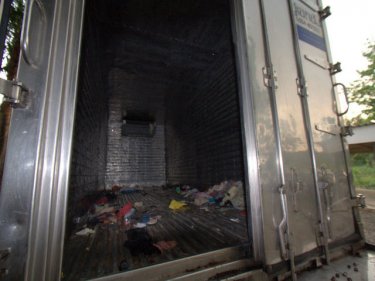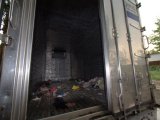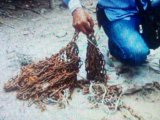The neighborhood cottage industry, the nice little earner for so many people for so long, is now a no-no. Can you believe it?
Officials who previously wouldn't leave the comfort of their swivel chair to so much as look at a Rohingya or a Bengali are suddenly enthusiastically embracing moral principles they had previously felt compelled to ignore in favor of easy money.
Suspicion, though, often falls in the wrong places.
Manit Pleantong, the district chief of Takuapa, north of Phuket, who has done so much to promote the grassroots movement against human trafficking, is under investigation.
Koh Lanta in Krabi is, according to reports, a hotbed of people-trading.
Both accusations are laughable, bad jokes being played by people forced out of their swivel chairs.
But that's what happens when the skeletons topple out of the closet, or in Thailand's case, emerge tragically from the shallow graves of southern Thailand's jungle and the sandy mangroves of the Andaman coast.
The billion baht business of trading people for profit is going bust - we hope for good - at long last.
Thailand's military government, unlike its predecessors, appears committed to weeding out the appalling crime of selling people for profit, a sin that has been tolerated for almost as long as we can remember.
BACK in April, 2008, a shocking case took Phuketwan to Ranong, the port on the Thai-Burma border.
A total of 121 Burmese, mostly affected by Cyclone Nargis, packed into a seafood container truck, heading south to start new lives on the booming tourist island of Phuket.
What they didn't know was that the air-conditioning wasn't working. With 120 people sucking oxygen inside the refrigerated compartment, it wasn't long before breathable air became rare and panic set in.
The driver couldn't hear the first knocks on the thick walls.
Eventually, the screams and the knocking reached an intensity that he could hear. He unlocked the huge rear doors. People tumbled out.
Fifty-four people died in that container.
Earlier this week, Khun Manit's team of volunteers stopped a car at the 24-hour checkpoint they operate near the town of Takuapa, north of Phuket, and out tumbled 10 Burmese migrants.
As it happened, according to Khun Manit, the driver worked for the same Ranong network that had grown and prospered since the 2008 nightmare.
Although three people went to jail for the deaths of the 54 Burmese, the business continued and expanded from Burmese into Rohingya.
The tragedy of the cool container failed to ignite national sentiment against trafficking in the way that the discovery of Rohingya and Bangladeshi bodies has done.
Today, the fingers are being pointed.
In villages along the southern border and the Andaman coast, authorities are now being told about neighbors with secret rooms in the basement and signs of unexplained wealth.
Traffickers, once seen as upright pillars of the community who spread around the benefits of their business as good times were followed by even better times, are today trying to explain away their connection with a hideous industry.
It's the end of an odious era that Thailand will quickly try to obliterate.
International journalists are now looking at the most intriguing question of all: how the Rohingya and Bangladeshis managed to be trucked hundreds of kilometres from the Andaman coast to the jungles of southern Thailand without being detected.
How Trafficking Works
Phuketwan Investigative reporter Chutima Sidasathian, still being sued for criminal defamation over a Reuters paragraph: ''It's worse and worse, day by day. Nobody cares''.
http://journeyman.tv/67116/short-films/rohingya-hd.html
LISTEN The Rohingya Solution
A tragedy almost beyond words has been unfolding in Thailand, where a human smuggling network is thriving with the full knowledge of some corrupt law enforcement officers. Alan Morison of Phuketwan talks to Australia's AM program.
http://www.abc.net.au/am/content/2015/s4231108.htm














Chutima, your courage and consistency in the trafficking matter, is highly appreciated. I believe the Navy will soon withdraw its indictments. The latest developments, unfortunately works for you. Unfortunately, because so many innocent lives have been lost.
Posted by Torben Lund on May 9, 2015 22:53